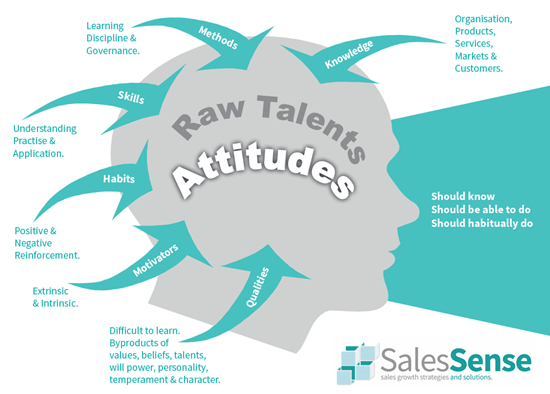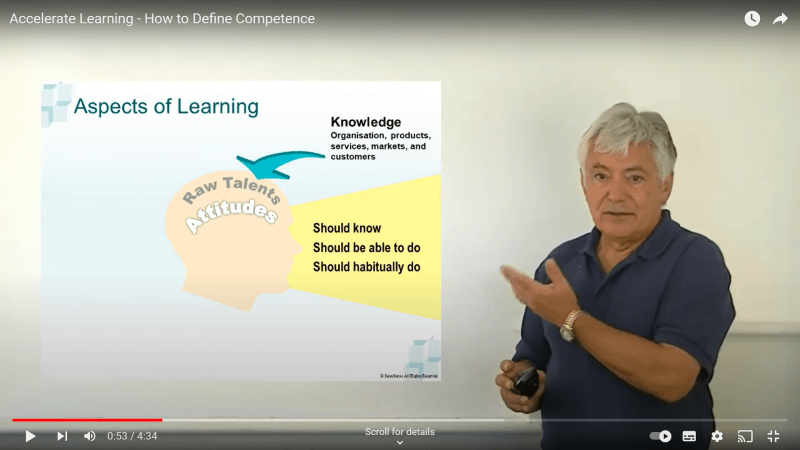Fast learning is best achieved through careful definition of the necessary knowledge, abilities, and behaviours.
If people have a model that clearly describes what constitutes competence in a desired skill, role or discipline then fast learning ensues.
Both the learners and their managers have the information necessary to accelerate the learning process.
This is part two of a short series of articles and videos that explain how to accelerate learning and motivate behaviour change. See Part 1 here.
Competence in anything is the combination of three things:
- Knowing what you should know
- Being able to do what you should be able to do
- And habitually doing what you should do

So when you know what you should know, can do what you should be able to do, and when you habitually do the things that should be done, you can be considered competent in a discipline.
We can break up learning into different aspects of competence so that we can more easily specify what must be learned.
In addition, recognising aspects of fast learning helps with the selection of the most effective learning actions.
When microlearning objectives are clear and distinct, motivated people learn faster. Learning takes less effort. Knowledge and techniques slot into prepared frameworks. Fast learning happens naturally.
Knowing What You Should Know
Knowledge can be defined as memorised factual information relating to a subject.
The formation of long-term memories is affected by motivation, repetition, and use of the information in conversations.
When something is new and exciting like learning to drive a car, our brains soak up facts easily. Anticipation builds a framework in our minds to connect the information. Excitement is a symptom of chemicals released in the brain that stimulate alertness and receptivity.
Knowing What Should Be Done
Step-by-step methods and checklists can be memorised although, more complicated methodologies warrant the use of written checklists and guides.
This is particularly true when skipping a step can have a disproportionate impact on the outcome.
Aircraft maintenance, pre-flight checks, and winning high-value sales are examples.
Having the Necessary Skills
Skill development depends on practise. The greater the frequency and duration of practise, the higher the level of skill acquired.
According to research collected by Malcolm Gladwell in his book Outliers, it takes 10,000 hours to become an expert in anything.
Easily relatable examples include learning a language, learning to play a musical instrument, and developing persuasiveness.
Establishing the Right Habits
Actions become habitual through repetition and the reinforcement of both failure and success.
Failure to look over your shoulder to check your blind spot before overtaking a car in front can result in severe shock and embarrassment or worse.
Remembering to look is positively reinforced when that glance prevents an accident.
Creating or Promoting Effective Motivation
Motivation affects how quickly we can commit learning to long-term memory.
Extrinsic motivators including external expectations and needs combined with intrinsic interests, passions, and causes combine to motivate learning.
The euphoria of success and the dejection of failure are sources of motivation that we can all draw on.
Developing the Right Mindset and Mental Character
Personal qualities are more difficult to define. They are embedded in personality and are slow to change yet do yield to persistent effort and therefore should be included here.
Values, beliefs, persistence, resilience, and temperament are some of the intangible characteristics that give rise to qualities.
Reasons to work on personal qualities include the desire to increase wealth and prosperity. If you want to make more money, adopt or develop the qualities exhibited by people who create and attract wealth.
If you want to provide better leadership, identify the qualities of outstanding leaders and make them your own.
This diagram aids the recognition of the factors determining competence and provides a framework for the construction of a competence model.
To make practical use of it, define what you should know, what you should be able to do, and what you should habitually do. Fast learning ensues.
Links, tools, and templates associated with this presentation help identify the factors that determine competence and aid the creation of a competence model.
Arrange a call with me and I will send you a free copy of our Sales Professionals Toolkit. It contains a sales skills and habits assessment together with over 100 workplace learning actions.
Use these other resources to accelerate your learning:
- Sales Knowledge Assessment
- What to do About the Changing Sales Environment
- Sales Competence Model
- Change Sales Habits and Behaviour with Ease
- I am the Captain of my Fate
- Motivating Behavioural Change
- 17 Ways to Change
- A Coach Will Make You Do It
- Benchmark Key Performance Indicators
- Better Ways to Bring About Learning
- The Key to Exceptional Performance
This is the second in a short series of articles and videos to help accelerate sales performance through fast learning techniques.
Article by Clive Miller
If you are looking for ways to facilitate fast learning or behaviour change, we can help. Telephone +44 (0)1392 851500. We will be pleased to learn about your needs or talk through some options. Alternatively, Send an email to custserv@salessense.co.uk for a prompt reply or use the contact form here.













